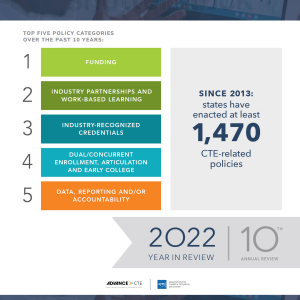This month, Advance CTE, in partnership with the Association for Career and Technical Education (ACTE,) has released the 2022 Year In Review, the tenth report of its kind. This report is a snapshot of Career Technical Education (CTE) legislation around the country, passed in 2022 through states’ respective legislatures. Designed to support state policymakers and other interested stakeholders, the Year In Review report offers the opportunity to see what solutions to common themes have been implemented and where.
Containing 123 policies enacted in 36 states, the report elevates innovative and particularly effective legislation across common policy themes, with healthcare being particularly prevalent with policymakers. As per previous reports, the Year In Review also lists highlights from the top five policy areas from 2022 which are:

For a more in-depth look at all of the enacted policies for this year, we have provided this accompanying online tracker, which allows users to search and filter for the policies they are looking for.
CTE leaders are encouraged to use the tracker and state highlight to consider how to apply these innovations in their states and communities to realize the CTE Without Limits vision framework. The following policies align with two principles where state leaders have expressed interest in increased action policy in both policy and practice:
Principle 4: Each learner’s skills are counted, valued, and portable
West Virginia mandated that the State Board of Education shall establish, develop, and maintain a program where students can earn up to six elective course credits for extended learning opportunities that take place outside of the traditional classroom setting. These experiences must be approved by the State Board of Education, and all teachers are required to have a background check. Each extended learning program will be evaluated at the end of its first year; if it meets the requirements, it may be approved for an additional five years. Students may receive transfer credits for extended learning programs.
Principle 5: Each learner can access CTE without borders
Kentucky established a virtual computer science career academy, implemented by nonprofit group WeLeadCS, to prepare high school students for careers in computing, particularly in the field of data science. The program will be delivered by teachers in a virtual, synchronous manner and will provide opportunities related to dual college credit, industry certifications and work-based learning. WeLeadCS must recruit and train certified teachers; collaborate with the Kentucky Center for Statistics to define workforce needs and opportunities; partner with employers, K-12 and postsecondary educations to develop initiatives to raise awareness of the program; and advise students in the academy about postsecondary degree opportunities, among other responsibilities.
Read the report to explore 18 state policy highlights and a longitudinal view of CTE policies passed in the last ten years. To celebrate this milestone, Advance CTE will be taking a look back at some of these policies and analyzing their effect on their CTE landscapes specifically through our CTE Without Limits vision framework throughout the year.
The 2022 Year in Review can be found here. Previous Year In Review reports may be found here.
Brice Thomas, Policy Associate
